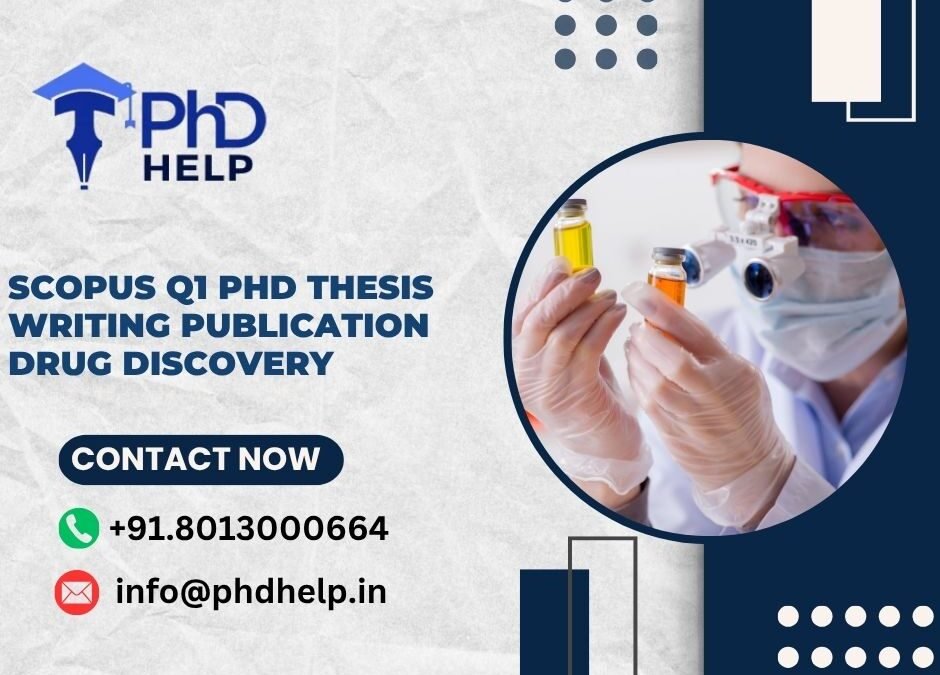SCOPUS Q1 PhD thesis writing publication Drug Discovery
SCOPUS Q1 PhD thesis writing publication Drug Discovery. Publishing your PhD thesis in SCOPUS Q1 journals within the field of Drug Discovery represents one of the highest levels of academic achievement. In the rapidly evolving pharmaceutical and biomedical research landscape, getting your research recognized by top-tier, peer-reviewed journals is both a testament to scientific rigor and an invaluable contribution to global healthcare innovation.
This article provides a comprehensive guide on how to write, structure, and publish a PhD thesis focused on Drug Discovery that aligns with the rigorous standards of SCOPUS Q1 publications.
Understanding SCOPUS Q1 Journals in Drug Discovery
SCOPUS Q1 journals rank among the top 25% of scientific journals worldwide, as measured by the SCImago Journal Rank (SJR). Publishing in these journals ensures maximum visibility, credibility, and citation impact.
Within the Drug Discovery domain, leading SCOPUS Q1 journals include:
-
Nature Reviews Drug Discovery
-
Journal of Medicinal Chemistry
-
Drug Discovery Today
-
European Journal of Medicinal Chemistry
-
Trends in Pharmacological Sciences
These journals focus on breakthrough innovations, mechanistic insights, and translational research that bridges basic science with clinical application.
Choosing a Research Topic in Drug Discovery
Selecting a strong and impactful research topic is the cornerstone of successful Q1 publication. The topic must demonstrate novelty, relevance, and scientific contribution to the global research community.
Key areas of high-impact research in Drug Discovery include:
-
Target identification and validation using genomics and proteomics.
-
AI-driven drug design and computational pharmacology.
-
Structure-based drug design and molecular docking.
-
High-throughput screening of bioactive compounds.
-
Novel drug delivery systems (nanoparticles, liposomes, and hydrogels).
-
Natural product-based drug discovery and biopharmaceutical innovation.
Selecting a topic that aligns with current research trends and unmet medical needs increases your chances of acceptance in SCOPUS Q1 journals.
Structuring Your PhD Thesis for SCOPUS Q1 Publication
A well-structured PhD thesis is crucial for transforming your research into publishable scientific papers. Below is the ideal structure that aligns with SCOPUS Q1 publication standards.
1. Abstract
Craft a concise, informative, and keyword-optimized abstract. Highlight the objective, methodology, key findings, and impact. Include 5–7 keywords related to drug discovery, such as “molecular docking,” “drug target,” or “pharmacokinetics,” to improve discoverability.
2. Introduction
The introduction should establish the context of your research—why your study is significant, what problem it solves, and how it contributes to the field. It should include:
-
Background on the disease or biological target.
-
Review of existing therapeutic limitations.
-
Research hypothesis and objectives.
3. Literature Review
An extensive literature review strengthens the foundation of your thesis. Cite recent Q1 journal articles to demonstrate academic awareness and connect your study with the latest discoveries. Focus on:
-
Recent advances in lead optimization.
-
In silico drug design models.
-
Preclinical validation and translational research.
4. Methodology
This section is critical for reproducibility and scientific credibility. Detail your experimental design and justify your choices. Include:
-
Compound synthesis or extraction methods.
-
In vitro and in vivo screening techniques.
-
ADMET profiling (Absorption, Distribution, Metabolism, Excretion, and Toxicity).
-
Computational methods such as molecular dynamics simulations or QSAR modeling.
5. Results
Present your results with clarity and precision using visual data representations — graphs, spectra, images, and tables. Emphasize key findings such as:
-
Binding affinities and structure-activity relationships (SAR).
-
Biological assay outcomes and mechanistic pathways.
-
Comparative efficacy against existing drugs.
6. Discussion
Interpret your results critically. Explain how your findings advance current knowledge and open new research avenues. Reference similar studies from top journals and highlight your study’s innovation, limitations, and potential for application in drug development pipelines.
7. Conclusion
The conclusion should summarize the main discoveries, research implications, and future prospects for clinical or industrial application. Reinforce how your research contributes to global health outcomes and supports pharmaceutical innovation.
Converting Your PhD Thesis into SCOPUS Q1 Publications
To transition from thesis to publishable manuscripts, follow a strategic publication plan:
-
Divide the thesis into multiple focused papers — each centered on a unique finding or experimental approach.
-
Align with journal scope — match your study’s focus with the journal’s area of interest.
-
Follow author guidelines — every Q1 journal specifies word count, reference style, and graphical requirements.
-
Refine the language — seek professional editing to ensure clarity, coherence, and academic tone.
-
Prepare a compelling cover letter — emphasize novelty, societal relevance, and the study’s scientific rigor.
Ensuring SCOPUS Q1 Standards of Research Integrity
Top-tier journals value not just results but also ethical research conduct. Ensure:
-
Compliance with Good Laboratory Practice (GLP) and Good Clinical Practice (GCP).
-
Use of reliable statistical tools for data validation.
-
Declaration of conflicts of interest and funding sources.
-
Submission of ethical approval certificates for studies involving humans or animals.
Ethical compliance ensures smooth peer-review and strengthens the journal’s confidence in your work.
Overcoming Challenges in Drug Discovery Publication
Publishing in SCOPUS Q1 journals is competitive, but understanding common obstacles helps improve success rates.
Common challenges and solutions include:
-
Limited novelty: Conduct broader literature gap analysis to identify unexplored mechanisms.
-
Language barriers: Utilize professional scientific editing and proofreading services.
-
Reviewer rejections: Incorporate reviewer feedback and consider resubmission to alternative Q1 journals.
-
Experimental inconsistencies: Validate data using replicates and statistical robustness.
Persistence and strategic planning are key to achieving successful publication acceptance.
Enhancing Visibility After Publication
Once your research is published, increasing its visibility and citation count is crucial for academic impact.
-
Share publications on ResearchGate, ORCID, and Google Scholar.
-
Present findings at international drug discovery conferences.
-
Collaborate with interdisciplinary research teams.
-
Use SEO-optimized abstracts and keywords for discoverability in SCOPUS databases.
Active post-publication promotion ensures long-term recognition and influence in the scientific community.
Conclusion
Publishing a PhD thesis in SCOPUS Q1 journals in Drug Discovery marks the pinnacle of research excellence. It demands not only innovation and methodological rigor but also precise academic communication and ethical integrity.
Through well-structured writing, strategic topic selection, and professional editorial guidance, scholars can successfully position their research within the global arena of high-impact drug discovery publications.
At the intersection of science and innovation, your thesis can become the foundation of future therapeutic breakthroughs and pharmaceutical advancements that shape modern medicine.
Thank you for read our blog “SCOPUS Q1 PhD thesis writing publication Drug Discovery”
Also read our more BLOG here
For PhD writing help Contact: +91.8013000664 || info@phdhelp.in

